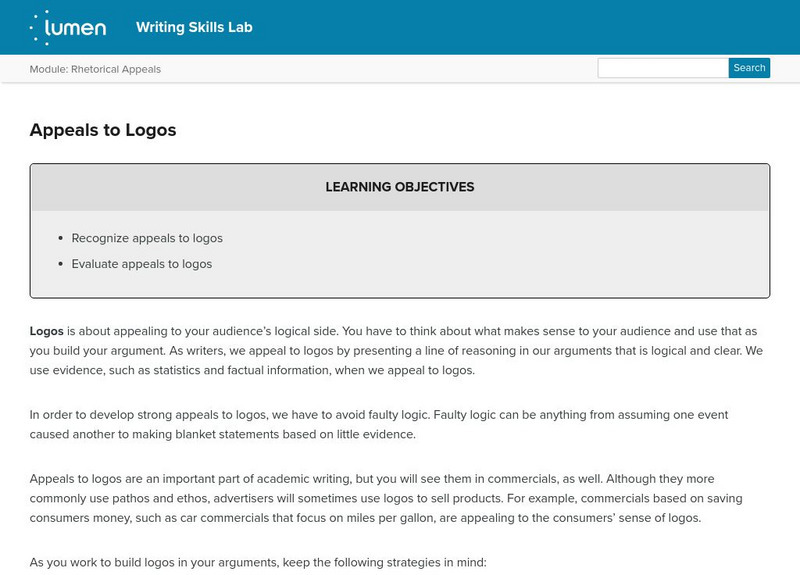Other
Nz Maths Problem Solving Lesson Plans: Level 5
Teachers, this New Zealand Problem Solving website is an outstanding resource for lesson plans. They are organized into the following categories: algebra, geometry, measurement, numbers, statistics, and logic and reasoning.
Other
Nz Maths Problem Solving Lesson Plans: Level 6
Teachers, this New Zealand Problem Solving website is an outstanding resource for lesson plans. They are organized into the following categories: Algebra, Geometry, Measurement, Numbers, Statistics, and Logic and Reasoning.
Khan Academy
Khan Academy: Getting Started With Logical Reasoning
The resource from Khan Academy provides practice questions for the LSAT. This section provides information about how to get started with the "Logical Reasoning" section.
Other
Nz Maths: Problem Solving Lesson Plans: Level 3 Problems
This New Zealand Problems website is an excellent resource for lesson plans in problem-solving. They are organized into the following categories: algebra, geometry, measurement, numbers, statistics, and logic and reasoning.
Other
Nz Maths Problem Solving Lesson Plans: Level 4
This New Zealand Problem Solving website is an outstanding resource for lesson plans. They are organized into the following categories: algebra, geometry, measurement, numbers, statistics, and logic and reasoning.
Lumen Learning
Lumen: Boundless Communications: Logical Appeals
This lesson focuses on using logical appeals in persuasive speeches including inductive and deductive reasoning, inductive reasoning and associative reasoning, forming a rational appeal, and errors in reasoning-formal and informal.
TED Talks
Ted: Ted Ed: Can You Solve the Famously Difficult Green Eyed Logic Puzzle?
One hundred green-eyed logicians have been imprisoned on an island by a mad dictator. Their only hope for freedom lies in the answer to one famously difficult logic puzzle. Can you solve it? Alex Gendler walks us through this green-eyed...
Other
College of the Holy Cross: The Logic of Scientific Reasoning [Pdf]
Explore the idea of the logic of scientific reasoning with this discussion of how science, thinking, and reasoning relate to one another.
PBS
Pbs Mathline: Bead Dazzling (Proportional Reasoning) [Pdf]
A comprehensive lesson on algebraic thinking where students create and identify patterns using proportional reasoning. Research based, this lesson includes technology connections, items for discussion, and extension activities.
Khan Academy
Khan Academy: Identify the Conclusion Examples
The resource from Khan Academy provides practice questions for the LSAT. This section provides examples of the "Main Conclusion" question type of the "Logical Reasoning" section.
Khan Academy
Khan Academy: Explain or Resolve Quick Guide
The resource from Khan Academy provides practice questions for the LSAT. This section provides information about how to identify, and then tackle, explain or resolve questions in the "Logical Reasoning" section.
Khan Academy
Khan Academy: Explain or Resolve Learn More
The resource from Khan Academy provides practice questions for the LSAT. This section provides information about how to identify, and then tackle, explain or resolve questions in the "Logical Reasoning" section.
Illustrative Mathematics
Illustrative Mathematics: 7.rp Art Class, Variation 1
Seventh graders explore proportional relationships using paint colors in this lesson.
Illustrative Mathematics
Illustrative Mathematics: 7.rp Music Companies, Variation 2
In this lesson plan students solve multi-step equations using proportional relationships.
Illustrative Mathematics
Illustrative Mathematics: 7.rp Finding a 10% Increase
Seventh graders use proportional reasoning to sovle a percent problem in this activity.
Iowa State University
Math Night Resources: Pencil and Paper Games
Play these pencil and paper games to engage learners in critical thinking and reasoning. Written directions are provided along with colorful animation to explain in detail how each game is played and possible strategies needed to win.
Lumen Learning
Lumen: Rhetorical Appeals: Appeals to Logos
This instructional activity focuses on appeals to logos, or appealing to your audience's logical side including your types of source material, remembering your audience, and being sure to maintain clear lines of reasoning throughout.
Lumen Learning
Lumen: Rhetorical Appeals: Kairos and Logos
This lesson focuses on the 4th logical appeal called Kairos, a time when conditions are right for the accomplishment of a crucial action; the opportune and decisive moment.
PBS
Pbs Mathline Lesson: Mix It Up [Pdf]
A lesson based on the story, "Oliver's Fruit Salad," where students explore the concept of proportional reasoning through modeling, student sharing, and questioning. A great introductory lesson for this concept that is sure to engage...
Other
Csicop: Field Guide to Critical Thinking
This article, originally published in Skeptical Inquirer, outlines some of the key components of the scientific problem-solving process while addressing the many reasons for the popularity of paranormal beliefs in the U.S. (Published in...
Sophia Learning
Sophia: Critical Reading as a Learning Strategy
This tutorial focuses on critical reading using a downloadable PowerPoint presentation, "Critical Reading 101," which includes separating fact from opinion, 6 propaganda techniques, and 6 common fallacies in reasoning. Also provided is...
Alabama Learning Exchange
Alex: Fun With Problem Solving
The object of this lesson is to teach students that problem solving can be interesting and fun. It is important to pay attention to what is asked and information that is in the problem.This lesson plan was created as a result of the...
Lumen Learning
Lumen: Rhetorical Appeals: Manipulative Appeals to Logos
This lesson focuses on how to determine if an appeal to logos is manipulative. It also provides a practice activity.
Khan Academy
Khan Academy: Identify the Technique Quick Guide
A quick LSAT prep guide to approaching questions that ask you to "identify the technique" where you are being asked to describe the reasoning of an argument: the way it uses support to justify a conclusion.







![College of the Holy Cross: The Logic of Scientific Reasoning [Pdf] eBook College of the Holy Cross: The Logic of Scientific Reasoning [Pdf] eBook](https://d15y2dacu3jp90.cloudfront.net/images/attachment_defaults/resource/large/FPO-knovation.png)
![Pbs Mathline: Bead Dazzling (Proportional Reasoning) [Pdf] Lesson Plan Pbs Mathline: Bead Dazzling (Proportional Reasoning) [Pdf] Lesson Plan](https://content.lessonplanet.com/knovation/original/114246-c0ff81bc865fdf767397fcd7c31f2652.jpg?1661409083)





![Pbs Mathline Lesson: Mix It Up [Pdf] Lesson Plan Pbs Mathline Lesson: Mix It Up [Pdf] Lesson Plan](https://content.lessonplanet.com/knovation/original/114249-5c08953e64aa805320eac921a29839e3.jpg?1661409096)




